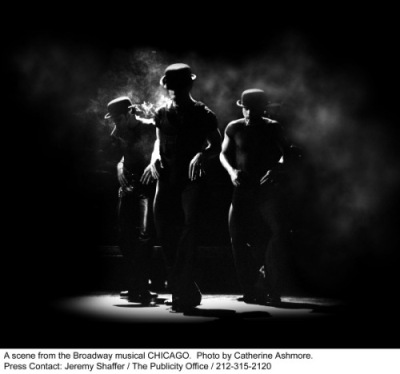Audiences familiar with the Bob Fosse classic, Chicago: The Musical, have probably learned one thing: crime pays. Although Chicago premiered on Broadway in 1975 and is the longest-running American show in Broadway history, the idea of bringing corruption and violence to life through lights, music and glamour is more relevant today than ever.
The national tour recently stopped in Tulsa, Okla. before it will make its way to Walton Arts Center March 11-16 for seven performances. Three of the show’s principals, Carol Woods (Matron “Mama” Morton), Ron Orbach (Amos), and Terra MacLeod (Velma Kelly) sat down with Walton Arts Center backstage to talk about their roles, time in Arkansas and “all that jazz.” John O'Hurley will play the principal role of Billy Flynn alongside Woods, Orbach and MacLeod in the upcoming performance.
 Walton Arts Center: What's your favorite part about the role you play?
Walton Arts Center: What's your favorite part about the role you play?
Carol Woods: My role isn’t huge, but it’s very relevant. There are so many funny parts that I love, but the scene with Velma and Roxie is my favorite. It opens up the story and gives you a lot of information and really sets the pace of the show.
Ron Orbach: Amos is the only uncorrupted character. The world is very seedy, but he’s really the one who the audience takes a shine to because he’s the one who’s always getting the short end of the stick. Given my history as an actor — I tend to play big, loud, cigar-smoking characters — whenever I come back to Amos, it’s sort of a breath of fresh air to just be simple and honest and unadorned. I also happen to have everyone’s favorite song in the play: “Mr. Cellophane.” Even people who haven’t seen the show know the song, and everyone goes out humming it.
Terra MacLeod: I love playing Velma because she’s resilient – she’s a survivor and a fighter. I don’t like saying “femme fatale” necessarily, but she doesn’t give up. I like characters who fight for something and she’s fighting for her freedom; she’s trying to get out of her circumstances so she can get back to where she was in life, and I appreciate that in a character.
WAC: How long have you been with the show?
CW: I’m a New Yorker, and my agent called me and told me there was an audition for the show in February 1997. I’ve been with the show ever since, and I still enjoy it. When this tour closes, I’m going back to New York to do it on Broadway — this tour ends March 30 and they’ve asked me to do a six-month stint beginning March 31. It just keeps going, like the Energizer Bunny!
RO: I’ve been doing it since the beginning like Mama [Carol] — we were in the first national company in 1997. So to have something like that that you keep returning to and that you grow old with is great — my Amos 17 years ago was a little different from my Amos now. But, it’s just amazing the staying power that the show has, and that it’s still so relevant to our culture. Maybe now more than ever.
WAC: What can audience members who have never seen the show expect when they come to see Chicago?
CW: Fun, education and lots of entertainment. In my opinion, it’s one of the most well-written shows —with both dialogue and music.
RO: I’d say that it’s not your father’s musical; it’s not Rogers and Hammerstein. It starts off with these sleek, scantily-clad people singing “All That Jazz,” and goes into the six merry murderesses shortly thereafter. Expect the unexpected.
TM: Minimalism. This show is kind of a concert version, and the dancers are all just in our black costumes and the lights tell the story. The band is onstage with us, but that’s it. It’s kind of like reading a book without having seen the movie — your mind creates the images. So this does take place in a jail, and yes, there are different scenes, but there’s no set to tell you that. And, it’s timeless. It’s a great piece of theater and it’s a classic. I think that’s why it has the longevity it has
WAC: Have you been to Arkansas before?
CW: Never, but I want to go to a diamond mine and find a big ole rock! I can make a night trip. I also hope to find people who want to be entertained.
hope to find people who want to be entertained.
RO: I’ve been to Little Rock and loved it. It’s a great little town. Recently, I drove across the country with my wife and we went through Arkansas, and I just thought it was gorgeous.
WAC: If you weren’t acting, what would you be doing instead?
CW: Well, I’m a singer. I sang in my grandfather’s church as I was growing up and I sang gospel before getting into theater. I also sang at nightclubs prior to getting into theater. So, I’d probably be a singer, and I’m also a fabulous cook. Let me tell you something: I do not brag about the gift that God gave me, which is my singing voice, but I do brag about my cooking. I just know it, and I know it because people love my food and I love to feed them.
TM: I really love photography. That’s another passion of mine. So, something to do in the photography field — I’m actually a photographer now, and run my own business. I’ve always had an artistic eye, so it would have to be something artistic. I’d be doing something on the other side of the lens, literally.
 Terra MacLeod as Velma Kelly (center). Photo by Paul Kolnik.
Terra MacLeod as Velma Kelly (center). Photo by Paul Kolnik.
